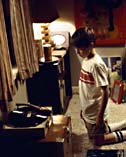
Movie Guru Rating:

Comment
on this review
| |

Cameron Crowe's rock 'n' roll memoir stumbles in the final chords
by Lee Gardner
You can almost smell the smoldering skunk weed and cheap wine as a group of shaggy '70s rockers takes the stage in a darkened arena and launches into a slow, stomping, bluesy number. The charismatic lead guitarist flashes a devilish grin; the lanky, bearded lead singer leans out towards the crowd and wails the lyrics, pouring out his soul to each and every cheering fan. A roadie has plastered a strip of white tape across the stage monitor at the frontman's feet. It reads "san diego."
There is no director better qualified to bring such a scene to the big screen than Cameron Crowe—he was there and taking notes. In the early '70s, long before he wrote and directed films such as Say Anything and Jerry Maguire, Crowe got his start as a teenage journalist, a precocious 15-year-old assigned by Rolling Stone magazine to follow the Allman Brothers and Led Zeppelin around on tour. With his new project, Almost Famous, he recaptures the details and ambiance of the mustache-rock era, a time when the golden gods of classic rock walked the earth. But he also tells his own story: A sheltered pubescent music geek is thrust into the fantasy world of rock stardom and forced to take its measure while torn between his own quirky family at home and the dysfunctional family of musicians and camp followers he joins on the road.
Obviously, Almost Famous is an intensely personal project for Crowe—he has much more invested than he might if he were merely trying to make a good rock movie or a simple coming-of-age tale. As such, the resulting film is a lot like one of those double-LP concept albums for which '70s bands were notorious—ambitious and often brilliant but also indulgent.
Crowe's most compelling skills as a filmmaker are his writing and his casting and direction of actors. Almost Famous totally rocks on both counts. Crowe's stand-in, William Miller (newcomer Patrick Fugit), is a baby-faced prodigy a little overwhelmed by his mother, and no wonder: Frances McDormand delivers a hilarious, touching performance as a fiercely strong and intelligent single mom whose smarts don't prevent her from maniacally overprotecting her only son and his older sister (Zooey Deschanel). Mom has a standing ban on rock music, insisting that it promotes "drugs and promiscuous sex" (and stabbing a finger at Paul Simon's pupils on a copy of Simon and Garfunkel's Bookends for proof). William's sister soon flees home, leaving him her contraband records with a note reading "Listen to Tommy with a candle burning and you will see your entire future." A rock critic is born.
William's earliest scribblings for underground papers bring him to the attention of real-life rock scribe Lester Bangs (Phillip Seymour Hoffman, stealing scenes willy-nilly), who warns the youngster, "Whatever you do, you cannot make friends with the rock stars." But soon enough, William is on the road covering a middling Midwestern rock band called Stillwater for Rolling Stone, his journalistic remove crumbling thanks to his new behind-the-scenes entré. While lead singer Jeff (Jason Lee, the very picture of an insecure frontman) good-naturedly refers to William as "the enemy—a rock writer," lead guitarist Russell (a note-perfect Billy Crudup) warms to the kid and brings him into his confidence. William also befriends beautiful, free-spirited "band aide" Penny Lane (doll-faced Kate Hudson in a breakout turn), who is sparking up a less platonic relationship with the already spoken-for Russell.
As Crowe knows and William discovers, the world of rock 'n' roll exists largely as an extended shared delusion wherein the most absurd things seem normal and expected and responsibility for one's actions is for sad stiffs with straight jobs. As William looks on, his new best buds almost break up over a T-shirt and succumb to the pitfalls of their growing fame; Russell eventually shows his callow side. Pursued across the country by phone calls from his editor and his concerned mother fretting at home, William must grapple with his turned-upside-down life, his jumbled feelings about Penny, and the fact that writing honestly about what he has witnessed will hurt the very people who have made him feel cool for the first time. When William, stuck in yet another anonymous hotel hallway, finally breaks down like the boy that he is, the film strikes a devastating chord.
But Crowe obviously survived it all intact, and his nostalgic fondness for the period is clear in the afternoon light that gilds the outdoor scenes and in the connoisseur's choice of '70s tunes on the soundtrack. Come the final reels, Almost Famous suddenly feels more like a movie than an honest memoir. A scene in which the band's small plane hits a storm, sparking all sorts of confessions and recriminations, feels all too scripted. A scene of Penny pirouetting in an empty ballroom to the cloying strains of Cat Stevens' "The Wind" evokes innocence and grace so self-consciously that it induces gagging. Even an O.D. scene plays like a stage-y bit from a vintage Billy Wilder comedy, safe as milk. Versions of these events may have actually happened, but by the film's closing third, Crowe himself seems to have succumbed to the Hollywood version of the rock 'n' roll fantasy the first two-thirds debunks, and a film that otherwise rings true ends in a symphony of false notes.

September 21, 2000 * Vol. 10, No. 38
© 2000 Metro Pulse
|